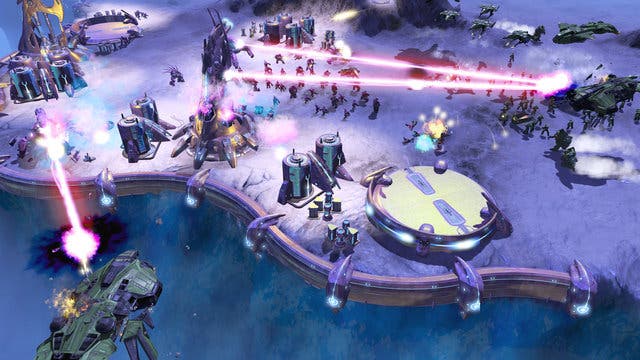Bungie bids Halo farewell
Eric Osborne looks back at 10 years of Master Chief.
There's definitely a lot of excitement about the future. The transition, for us, marks the moment when 100 per cent of the studio is now laser-focussed on our future. So there's definitely a lot of anticipation. People are really ready to start talking about the next thing. Even if it's going to be a little while before we start revealing it - people are starting to get amped up.
We have out internal Bungie day happening tomorrow to coincide with the film launch. We're definitely pumped, we're definitely excited, we're definitely working. There's that feel of being in the thick of it again. It's a different world for us – we're an independent studio, so the next thing we do is going to be vital to our success. We know that although we have this legacy, we're definitely focussed on the future and making sure our next step is the right one. Pete says 'we're going to bask in our own glory or bathe in our own blood'. That's our CEO Pete Parsons, he's just standing behind me, piping in.
There's not a whole lot of worry to be quite honest. I think we've done a pretty good job of establishing and setting up a universe. Our guys have been working at it for 13 years now, so it's a fairly established franchise and a fairly established brand that has a lot of fans and people who love it. We just want to see that continue. I don't know that there are any real strong concerns. There's a little bit of emotion attached to the transition itself but we're definitely ready to do something new.
It's all new. We don't have any insight. I can't really spoil anything or give you any secrets. They're all outside the studio now. And if I had any information and disclosed it I think Microsoft would be very upset with me.
If you want, I can spoil Halo CE Anniversary for you though. So, Master Chief and Cortana live, the Halo ring explodes and if you play in legendary you'll see Sgt Johnson's twin brother, Sgt Shwanson, engulfed by the explosion at the Pillar of Autumn. A lot of people don't know that. They think it's Johnson, but it's actually a doppelganger. Or, maybe not...

I don't have a take or a company stance. I think if you talk to Microsoft about Halo Wars they would probably mark it as a success - it sold millions of copies. I think if you look at the core fans – when you create a product for core fans and you want to make sure the story is solid and it resonates with them, I think it did a pretty good job in that regard. There aren't too many people who mark it as a tremendous failure.
I think we're really comfortable with the approach we took. We had five Halo games and we love them all in different ways and creatively we were able to expand and do other things, work with people on things like the graphic novel and some of the other ancillary stuff. So we definitely had plenty to tackle with the games themselves and got enough flexibility to work on other things that excited us, work with other talented people outside the core experience.
I think there was some broader context to that conversation. There's always that choice quote you can pull out to give impact to a headline or to supercharge a statement but I don't think he was attempting to say the games were not well-received or didn't do well. I think you can look to his comments around Halo: Reach's launch where he marked it as the most successful Halo launch title, comparing it to Halo 3. He also said a really, really nice thing about the game itself beyond just the business metrics. These things get pulled out of context. They are what they are. If you go back and read the full interview I don't think you'll find too much there that's super alarming or cause for concern.
Going forward, it's their franchise, their IP, and the direction they take has got to be their own. I think for fans, the message for them is that they need to allow Microsoft the creative flexibility to let them do what they need to do. In the same way they gave it to us.
